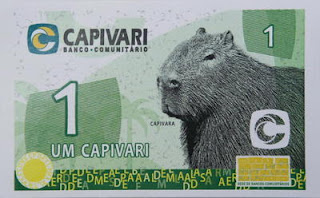Nothing easier.
All you have to do is to establish a community bank.
And start printing a local currency.
In Cidade de Deus (the place where City of God was filmed, and a stop on Barack Obama’s South American tour this year) the banknotes are called CDDs.
In the little town of Silva Jardim, sixty miles north of Rio de Janeiro, they’re called Capivaris, after a pig-sized rodent commonly found in a local river.
And the ones in 62 other towns throughout Brazil are named after everything from the sun to varieties of cactus and even Brazil nuts.
Then you open a storefront that serves as a bank, where you freely exchange the local currency for the national currency at a rate of one-to-one. And, to make sure you don’t get into trouble with the federal government, you deposit the national currency in a bank, where it serves as a guarantee.
Next, you convince the local merchants to give discounts for purchases made in the new currency. The discounts apply to everything from haircuts to groceries, from clothing to electrical appliances. And they range from ten to twenty percent. With savings like those, all of the consumers fall into line and start exchanging and spending the local currency instead of the national currency. And the merchants quickly discover that the discounts they offer are more than being compensated for by increased sales.
The economy of the town benefits twofold: firstly by helping to ensure that money earned in the town is spent in the town, and secondly, by attracting people from outside the city limits who start flocking-in to exchange their money and start spending it. Most merchants experience an increase in revenue of some thirty percent.
Nobody has actually started counterfeiting the local currencies as yet, but as a safeguard, the banknotes all bear watermarks, serial numbers and holograms – just like the national currency.
The first ones were the brainchild of a social activist and former seminarian named Joaquim Melo.
He called them palmas (palms) and launched them in the mid-1990’s in a small town called Conjunto Palmeiras in the State of Ceára.
And they’ve been gaining currency (sorry, couldn’t resist) throughout Brazil ever since.
Leighton - Monday























